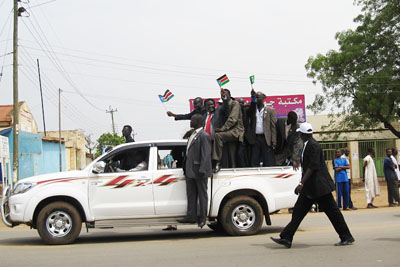
JUBA, Southern Sudan – Six kids to care for, husband’s left town so she’s on her own, it’s over 100 degrees Fahrenheit and at 10 a.m., it seems like it’s already been a long day for Stella, a southern Sudanese woman running a tea and coffee stand in a market on the outskirts of Juba.
As she roasts coffee beans over a charcoal stove, Stella responds with passion to my casual inquiries about Sudan’s upcoming elections, but as my friend Isa translates from Juba Arabic to English for me, I realize Stella is not voicing her enthusiasm for a particular candidate or political ideology; she is angry about her own situation as a single mother trying to make ends meet.
Stella says she wishes she could work for the Government of Southern Sudan, because from her perspective, the people who do work in government are the ones with money. (Isa explains that she probably is referring to work as a cleaner or a tea service person in a government office, given that she is not literate.) As for the elections, she says through my friend’s translation that “there’s no money in the elections.” From our short conversation, this statement seems perfectly logical to me. Her primary concern is supporting her family, and if participating in the elections could help her to do this, she would. I don’t think it is a stretch to posit that Stella’s personal experiences have not given her good reason to view the elections as a vehicle for political and practical change in her country.
I stopped for tea at Stella’s stand because I wanted to ask her about the large campaign poster hanging outside the market entrance. The sheet was painted with red and blue letters that read: “SPLM: New Sudan, Yes We Can.” When I first saw this poster, I was amused by the clever wordplay and reference to President Obama’s campaign. But after talking to Stella – and learning that she was not aware of the meaning of the campaign slogan because she cannot read and no one explained it to her – I better understood the disconnect between the complex arena of Sudanese politics and the basic yet monumental needs of ordinary Sudanese people. The conversation was a reminder of the space between the political wrangling that I often report about and the expectations and priorities of the majority of Sudanese people.

